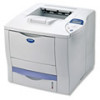Brother International HL-7050N Network Users Manual - English - Page 128
Using DHCP to Con the IP address, Using ARP to Con the Print Server IP Address
 |
UPC - 012502603375
View all Brother International HL-7050N manuals
Add to My Manuals
Save this manual to your list of manuals |
Page 128 highlights
Using DHCP to Configure the IP address The Dynamic Host Configuration Protocol (DHCP) is one of several automated mechanisms for IP address allocation. If you have DHCP Server in your network (typically a Unix, Windows® NT/2000 or Novell Netware network) the print server will automatically obtains its IP address from DHCP server and register its name with any RFC 1001 and 1002-compliant dynamic name services. If you do not want your print server configured via DHCP, BOOTP or RARP, you must set the BOOT METHOD to static so that the print server has a static IP address. This will prevent the print server from trying to obtain an IP address from any of these systems. To change the BOOT METHOD, use the printer's control panel (for those printers that have a LCD panel), TELNET (using the SET IP METHOD command), a Web browser or by using the BRAdmin application. Using APIPA to Configure the IP Address With Automatic Private IP Addressing (APIPA), DHCP clients automatically configure an IP address and subnet mask when a DHCP server is not available. The device chooses it's own IP address in the range 169.254.1.0 through to 169.254.254.255. The subnet mask is automatically set to 255.255.0.0 and the gateway address is set to 0.0.0.0. By default, the APIPA protocol is disabled. Using ARP to Configure the Print Server IP Address If you are unable to use the BRAdmin application or the printer's control panel and your network does not use a DHCP server, you can also use the ARP command. ARP is the simplest method of configuring the print server's IP address. The ARP command is available on Windows® systems that have TCP/IP installed as well as Unix systems. To use arp enter the following command at the command prompt: TCP/IP CONFIGURATION 12 - 5















